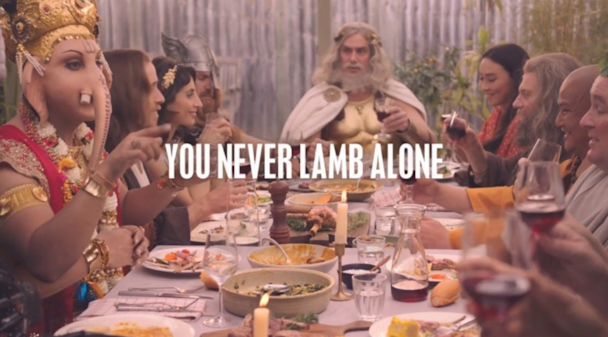Meat and Livestock Australia: We don’t set out to be controversial
Meat and Livestock Australia (MLA) has admitted it was taken aback by the recent backlash towards its recent Lamb advert despite the brand’s history of controversial advertising.

Meat & Livestock Australia talks about its controversial advertising
MLA group marketing manager Andrew Howie told The Drum, the brand, along with its advertising agency The Monkeys, had worked hard to ensure the message of inclusion and unity would not offend audiences.
“Having had uproar and controversy before, we wanted to be really careful and make sure that all religions were presented equally and that no religion was portrayed in a more positive or negative light.
“So, with the amount of time and effort that we put into that, I probably didn’t expect the level of feedback,” said Howie.
The MLA ad, which features religious gods and prophets from different faiths and beliefs coming together to share a lamb meal, attracted global headlines for depicting Indian god Ganesha as a meat eater. However, Howie maintains the aim was to showcase an inclusive message of how lamb can bring people together under its ‘You Never Lamb Alone’ positioning.
“Our version of inclusion was to make sure that everyone was included in some way. We’ve got both Ganesha and Buddha there, who we know are vegetarian gods, but we are a brand that tries to be inclusive, so if we create an ad and we choose to include only some of the religions that just seems disingenuous. How can we do an ad about inclusion but leave out a couple of religions? It’s like saying I’m going to have a party and anyone can come except for you two.”
“Our intentions were good, our intentions were pure, and we came from a point of view that even though we know that these people didn’t want to eat our product they were still invited to come and hang out with us. Everyone is welcome in the world of lamb, regardless if you want to eat it or not.”
“The intention of having Buddha and Ganesha in this ad was not to upset or to isolate or to vilify but completely the opposite. The fact that aspects of the community saw it that way is really disappointing,” said Howie.
The campaign inspired more than 50 complaints to the Advertising Standards Bureau (ASB), along with a number of public campaigns including an official complaint from The High Commission of India to the Australian Government.
This week, the ASB dismissed the complaints against the MLA finding the ad had not breached the AANA code of advertising.
Courting Controversy
However, this is not the first time the MLA has felt the heat from the public and the ASB.
While the MLA has created some of Australia’s most iconic advertising - a classic 1989 ad, saw a young Naomi Watts, win a competition to have dinner with Tom Cruise only to turn it down because “Mum’s cooking a lamb roast” - it has also created some of its most controversial advertising.
A decade-long campaign of Australia Day advertising which featured sports personality Sam Kekovich, delivering a satricial address to the nation, was a much-loved annual traditional. However, it also attracted more than its share of complaints, particularly when Kekovich called vegetarians ‘un-Australian’ for not eating lamb.
A 2015 MLA ad featuring cricket legend Richie Benaud inviting famous Australians from the past and present to an Australia Day BBQ received criticism for its white-male view of Australian history.
However, it was the 2016 ‘Operation Boomerang’ campaign which attracted the most heat receiving 750 complaints to the ASB, “a record at the time”, according to Howie.
The ad depicted an operation to bring overseas Australians home for Australia Day where they could enjoy a lamb meal. The ad was heavily criticised for a scene where a vegan’s apartment was set on fire, as well for using ‘Boomerang’ which many deemed insensitive, particularly for promoting Australia Day.
“We kind of stumbled on controversy quite accidentally,” said Howie. “That caught us all by surprise. We were quite upset about it, we made a mistake with using the term 'Boomerang' and we knew we had done wrong and we wanted to make amends.”
The MLA responded to the controversy by stepping up its messages of inclusion and diversity, however, that has also attracted criticism, controversy and more complaints. While all of the brand’s recent ads have been investigated by the ASB, they have all been cleared with the brand yet to have an ad banned.
“Controversy has not been the thing that we set out to achieve, but I think when you talk about things that make people feel a little uncomfortable you get controversy. We believe these are conversations that need to be had,” said Howie.
While there’s no denying the controversy makes headlines and boosts audience views - the latest lamb ad attracted more than 4m views in less than one week - but does the controversy detract from the brand and the product message or does it enhance it?
“I think the important thing for us is that we stand for bringing people together and the reality is, that standing for inclusion means that you take the stance or position of the majority.
“The topics that we talk about and the points of view are always something that resonates with the majority of people and I think that is why the campaigns have been so successful and have had really strong sales results.
“There are aspects of the community that seek out controversy for controversy’s sake, we have outspoken politicians who canvas the angry minority out there and elicit hate. We are the opposite. We are for love and inclusion and I think the latest campaign, despite the feedback from small aspects of the community, the less vocal side of the community are on board and like this idea of inclusion – including members of the Hindi community. But the reality is their voices are not being heard because those who are most upset are the squeakier wheel.
“The last thing we want is the conversation to be so focused on this idea of discrimination and vilification that it really draws the conversation away from our purpose. The closing line to the ad is, 'we really should get together more often, it would make the universe a better place' and that is ultimately the idea behind this.
We wanted to say, 'let’s put aside our differences' and share a meal, and for us, the research showed that more religions can eat Lamb.”
Effective Advertising
While Howie says he’s not sure he believes in the old adage that ‘all publicity is good publicity’, he does admit that the brand’s message of inclusion and diversity, and the role lamb plays in bringing people together, is having an impact on Australian consumers.
“The proof is in the freedom we are afforded to keep making these ads, I think if they weren’t working we would have to change course. The ‘Operation Boomerang’ ad was the most effective advertising campaign in Australia as judged by the Effie awards last year. The long-term ROI on the ‘Never Lamb Alone’ campaign remains one of the most effective in Australia.”
Howie said the MLA has returned more than $3 for every $1 spent on advertising to Australian sheep farmers over the last couple of years. What’s more, lamb sales continue to grow despite an overall decline in meat consumption within Australia. While beef remains the number one meat in Australia, followed by Chicken, Lamb has secured the third spot with a 14-15% share of the market (it fluctuates
While beef remains the number one meat in Australia, followed by chicken. Lamb has secured the third spot with a 14-15% share of the market (it fluctuates seasonally), ahead of pork, seafood and turkey.
“We have two years of record baseline growth and that’s in a market where overall Australians, along with many western countries, are starting to eat less meat as a whole.
“Australia is the second largest consumer of meat behind the US. We are carnivores as a nation but we are starting to eat less protein. The fact that we are obtaining growth in a market that is shrinking really shows that we are taking share in a declining market.
“We are seeing a lot of impact for the work we are doing. A lot of people talk about the controversy but the reality is its broader than that. The message of unity and bringing people together is always in our advertising and whether you personally choose to believe it or not, what we know is that people buy lamb because they buy into the idea of people enjoying it together. If you are having a party you put lamb on,” said Howie.

